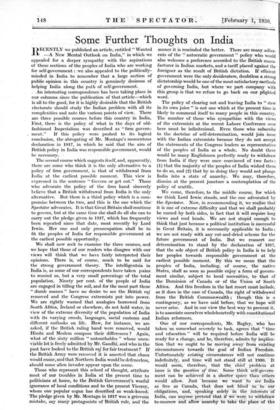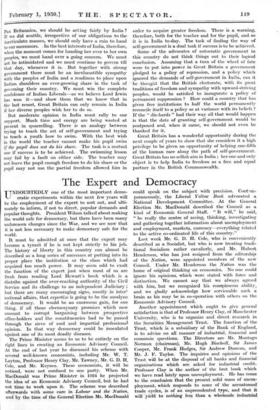Some Further Thoughts on India
RECENTLY we published an article, entitled " Wanted —A New Mental Outlook on India," in which we appealed for a deeper sympathy with the aspirations of those sections of the peoples of India who are working for self-government : we also appealed to the politically- minded in India to remember that a large section of public opinion in this country is genuinely desirous of helping India along- the path of self-government.
An interesting correspondence has been taking place in our columns since the publication of that article—which is all to the good, for it is highly desirable that the British electorate should study the Indian problem with all its complexities and note the various points of view. There are three possible courses before this country in India. First, there is the policy of what in the days of old- fashioned Imperialism was described as "firm govern- ment." If this policy were pushed to its logical conclusion, the abrogating of Mr. Montagu's momentous declaration in 1917, in which he said that the aim of British policy in India was responsible government, would be necessary.
The second course which suggests itself, and, apparently; there are some who think it is the only alternative to a policy of firm government, is that of withdrawal from India at the earliest possible moment. This view is expressed in the sentence " Govern or get out." Those who advocate the policy of the firm hand sincerely believe that a British withdrawal from India is the only alternative. But there is a third policy which is a com- promise between the two, and this is the one which the Spectator advocates. It is that Great Biitain shall continue to govern, but at the same time she shall do all she can to carry out the pledge gien in 1917, which has frequently been repeated since that date, most recently by • Lord Irwin. Her one and only preoccupation shall be to fit the peoples of India for responsible government at the earliest possible opportunity.
We shall now seek to examine the three courses, and we hope that those of our readers who disagree with our views will think that we have fairly interpreted their opinions. There is, of course, much to be said for the strong government theory. The intelligentsia in India is, as some of our correspondents have taken pains to remind us, but a very small percentage of the total population. Ninety per cent. of the people of India are engaged in tilling the soil, and for the most part these " dumb masses " have no desire to see the British raj removed and the Congress extremists put into power. We are rightly warned that analogies borrowed from South Africa, Ireland or elsewhere, do not hold water, in view of the extreme diversity of the population of India with its varying creeds, languages, social customs and different outlooks on life. How, for instance, we are asked, if the British ruling hand were removed, would Hindu and Moslem compose their differences ? Again, what of the sixty million " untouchables " whose unen-* viable lot is freely admitted by Mt. Gandhi, and who in the past have looked to the British raj for fair treatment? If the British Army were removed it is asserted that chaos would ensue; and that Northern India would be defenceless, should some alien invader appear upon the scene.
Those who represent this school of thought, attribute most of our troubles in India at the present time to politicians at home, to the British Government's woeful ignorance of local conditions and to the present Viceroy, whom one popular organ has described as weak-kneed.
The pledge given by Mr. Montagu in 1917 was a grievous mistake, say many protagonists of 'British rule, and the sooner it is rescinded the better. There are many adher. ents of the " autocratic government " policy who would also welcome a preference accorded to the British manu- facturer in Indian markets, and a tariff placed against the foreigner as the result of British dictation. If efficient government were the only desideratum, doubtless a strong dictatorship would be one of the most satisfactory methods of governing India, but where we part company with this group is that we refuse to go back on our plighted word. - The policy of clearing out and leaving India to " stew in its own juice " is not one which at the present time is likely to commend itself to many people in this country. The number of those who sympathize with the views of the extremists at the recent Lahore Conference over here must be infinitesimal. Even those who subscribe to the doctrine of self-determination, would join issue with the Indian extremists because they do not accept the statements of the Congress leaders as representative of the peoples of India as a whole. No doubt there would be many Englishmen perfectly ready to withdraw from India if they were once convinced of two facts : (1) that the majority of the peoples of India wished them to do so, and (2) that by so doing they would not plunge India into a state of anarchy. We may, therefore, dismiss at the present juncture a contemplation of the policy of scuttle.
We come, therefore, to the middle course, for which we think Lord Irwin stands, and the one advobated by the Spectator. Now, in recommending it, we realize that it is one of extreme difficulty and that we shall probably be cursed by both sides, in fact that it-will require long views and cool heads. We are not stupid enough to think that just because a political institution is successful in Great Britain, it is necessarily applicable to India ; we are not ready with any cut-and-dried scheme for the future government of India. But we reassert our determination to stand by the declaration of 1917, that the sole object of British policy in India is to help her peoples towards responsible government at the earliest possible moment. By this we mean that the peoples of India, including, of course, the native States, shall as soon as possible enjoy a form of govern- ment similar, subject to local necessities, to that of the Dominion of Canada or of the Union of South Africa. And this freedom in the last resort must include, as it does in the case of Canada, the right of withdrawal from the British Commonwealth ; though this is a contingency, as we have said before, that we hope will never arise. And in our view the best way to prevent it, is to associate ourselves wholeheartedly with constitutional Indian reformers.
- One of our correspondents, Mr. Bagley, who has taken 'us somewhat severely to task, agrees that " time and education " will be required before India will be ready for a change, and he, therefore, admits by implica- tion that we ought to be moving away from existing circumstances towards the goal of Indian Freedom. Unfortunately existing circumstances will not continue indefinitely, and time will not stand still at 1930. It would seem, therCfore, that the chief problem at issue is the question of time. Some think self-govern- ment can be achieved in a shorter space than others would allow. Just because we want to see India as free as Canada, that does not blind us to our obligations, and, speaking solely in the interests of India, can anyone pretend that if we were to withdraw to-morrow and allow anarchy to take the place of the pax Britannica, we should be acting fairly by India ? If we did scuttle, irrespective of our obligations to the inarticulate masses, we should only have a ruin to hand to our successors. In the best interests of India, therefore, when the moment comes for handing- her over to her own peoples, we must hand over a going concern. We must not be intimidated and we must continue to govern till that day, whenever it is. But together with strong government there must be :an inexhaustible sympathy with the peoples of India and a readiness to place upon Indian shoulders an ever-growing share in the task of governing their country. We must win the complete confidence of Indian Liberals—as we believe Lord Irwin has won itand show them that we know that in the last resort, Great Britain can only remain in India if her' diverse peoples wish her to do so.
But moderate opinion in India must rally to our support. Much time. and energy are being wasted at present in quarrelling. There is an analogy between trying to teach the art of self-government and trying to teach a youth how to swim. With the best wish in the world the teacher cannot make his pupil swim if the pupil does not do his share. The task is a mutual one if success is to be achieved. The swimming lesson may fail by a fault on either side. The teacher may not leave the pupil enough freedom to do his share or the pupil may not use the partial freedom allowed him in order to acquire greater freedom. There is a warning, therefore, both for the teacher and for the pupil, and so it is in India to-day. The task of finding the way of self-government is a dual task if success is to be achieved.
Some of the advocates of autocratic government in this country do not think things out to their logical conclusion. Assuming that a turn of the wheel of fate were to put into power in Great Britain a government pledged to a policy of repression, and a policy which ignored the demands of self-government in India, can it - be thought that the British electorate, with its great traditions of freedom and sympathy with upward-striving peoples, would be satisfied to inaugurate a policy of permanent suppression ? How could a country that has given free institutions to half the world permanently reconcile itself to a policy so at variance with its beliefs ? If the " die-hards " had their way all that would happen is that the date of granting self-government would be postponed and, when it came, we should not even be thanked for it.
Great Britain has a wonderful opportunity during the next couple of years to show that she considers it a high privilege to be given an opportunity of helping one-fifth of the human race along the path of self-government. Great Britain has no selfish aim in India ; her one and only object is to help India to freedom as a free and equal partner in the British Commonwealth.







































 Previous page
Previous page